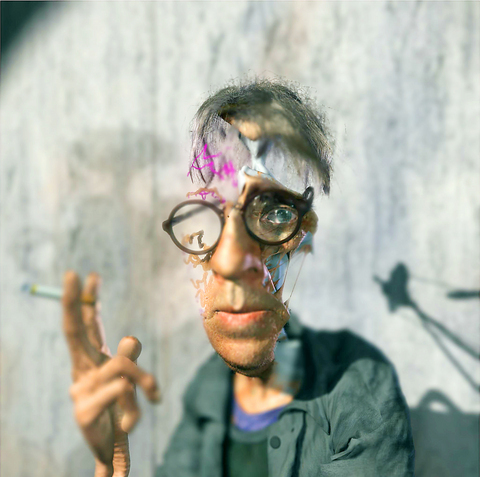Following the two-week marketing campaign for The Wayward Cloud (
Apart from the box office sales, Tsai is receiving other cash rewards. Last Thursday before the film's premiere, Kaohsiung City presented Tsai with NT$10 million because most of the film's scenes were shot in Kaohsiung.
Kaohsiung City set up the prize during Frank Hsieh's (

PHOTO COURTESY OF URBAN NOMAD
But the film's controversial content has led some Kaohsiung city citizens to begin questioning the policy. Last weekend at one Kaohsiung screening, a movie-goer walked out of the theater with angry sentiments: "Is it right to use us taxpayer's money to give to a film like this?"
This weekend, two mini film festivals will showcase more than 60 non-mainstream films.
Canadian Spring is a showcase of new and classic films from Canada (

PHOTO COURTESY OF SPOT
The Urban Nomad Film Fest (城市游牧影展), a showcase of independent shorts and animations will take place from tonight until Sunday night at Treasure Hill (寶藏巖), a community in south Taipei that has been revamped to be an open-air public space for contemporary arts events.
Two feature-length dramas by renowned director Denys Arcand will be the main focus at the Canadian Spring showcase. These include The Barbarian Invasion, which won the 2004 Oscar for best foreign language film, and the 1986 work The Decline of American Empire, which brought Arcand international fame.
Barbarian is a tragicomedy which has intense drama and vivid illustrations to tell the story of a free-spirited liberal professor facing the last days of his life and then looks at the different reactions and treatments from his friends and family.

PHOTO COURTESY OF URBAN NOMAD
Decline is an intriguing drama about four men and four women talking about sex, the female body and love affairs at one dinner party.
Besides the two dramas from Arcand, the opening film of Canadian Spring is worth checking out for its highly controversial topic. Casuistry: The Art of Killing a Cat scratches its way beneath the surface of an infamous Toronto animal cruelty case and deftly explores the opaque logic surrounding this macabre act, according to the Spot and e.bell Web sites.
Jesse Power, ex-vegetarian, was an art student when he conceived the act that inspired the film. In May 2001, he enlisted two friends, Anthony Wennekers and Matthew Kaczorowski, to help him kill a cat. The intention was to make a video that protested the unthinking consumption of factory-slaughtered animals by killing, cooking and eating a cherished domestic pet -- a feline posthumously named "Kensington" by animal-rights activists. Alerted by an outraged roommate, the police found the skinned and decapitated cat in the beer fridge. Kaczorowski fled and was apprehended in Vancouver two years later. All three eventually pleaded guilty to animal cruelty and mischief charges.
Coming into its fourth year, the Urban Nomad Film Festival presents a larger showcase this time with 50 short films. The event was organized by two expat journalists David Frazier and Sean Scanlan, and it looks to become a rare-find film festival in Taipei that preserves an underground spirit and a sense of raw creativity.
The independent films selected in the showcase are a mixture from four sources: US underground film scenes, Taiwanese film schools, overseas Taiwanese filmmakers and films made by expats in Taiwan. Genres include narrative, CG animation, experimental, surf videos, comedy, absurdity, documentary.
Nineteen-seventy-four is a 23-minute film that gives an amazing look at the seduction between a Taiwanese girl student and her English teacher. TC Lin (
There are also two documentaries that record ongoing international tragedies. The film Boom documents the civil war in Liberia and shows the heavy mortar shells and innocent people murdered. Those Left Behind looks at relief work in Sri Lanka one month after the devastating tsunami, as well as the political turmoil of the island nation.
There is also a CG animation about an innocent blow-up doll who gets abused by her new owner, titled Innocent Life.
The location of Urban Nomad also highlights an underground creativity. Finnish architect/designer Marco Cassagrande will help build an outdoor theater by the river by using bamboo and plastic sheets to make a tunnel above a short bridge. The audience will view the films sitting on the bridge. There will also be cases of Heineken provided.
For more program information check out the Urban Nomad blogsite, http://urbannomadfilmfest.blogspot.com.

In the March 9 edition of the Taipei Times a piece by Ninon Godefroy ran with the headine “The quiet, gentle rhythm of Taiwan.” It started with the line “Taiwan is a small, humble place. There is no Eiffel Tower, no pyramids — no singular attraction that draws the world’s attention.” I laughed out loud at that. This was out of no disrespect for the author or the piece, which made some interesting analogies and good points about how both Din Tai Fung’s and Taiwan Semiconductor Manufacturing Co’s (TSMC, 台積電) meticulous attention to detail and quality are not quite up to

April 21 to April 27 Hsieh Er’s (謝娥) political fortunes were rising fast after she got out of jail and joined the Chinese Nationalist Party (KMT) in December 1945. Not only did she hold key positions in various committees, she was elected the only woman on the Taipei City Council and headed to Nanjing in 1946 as the sole Taiwanese female representative to the National Constituent Assembly. With the support of first lady Soong May-ling (宋美齡), she started the Taipei Women’s Association and Taiwan Provincial Women’s Association, where she

It is one of the more remarkable facts of Taiwan history that it was never occupied or claimed by any of the numerous kingdoms of southern China — Han or otherwise — that lay just across the water from it. None of their brilliant ministers ever discovered that Taiwan was a “core interest” of the state whose annexation was “inevitable.” As Paul Kua notes in an excellent monograph laying out how the Portuguese gave Taiwan the name “Formosa,” the first Europeans to express an interest in occupying Taiwan were the Spanish. Tonio Andrade in his seminal work, How Taiwan Became Chinese,

Mongolian influencer Anudari Daarya looks effortlessly glamorous and carefree in her social media posts — but the classically trained pianist’s road to acceptance as a transgender artist has been anything but easy. She is one of a growing number of Mongolian LGBTQ youth challenging stereotypes and fighting for acceptance through media representation in the socially conservative country. LGBTQ Mongolians often hide their identities from their employers and colleagues for fear of discrimination, with a survey by the non-profit LGBT Centre Mongolia showing that only 20 percent of people felt comfortable coming out at work. Daarya, 25, said she has faced discrimination since she